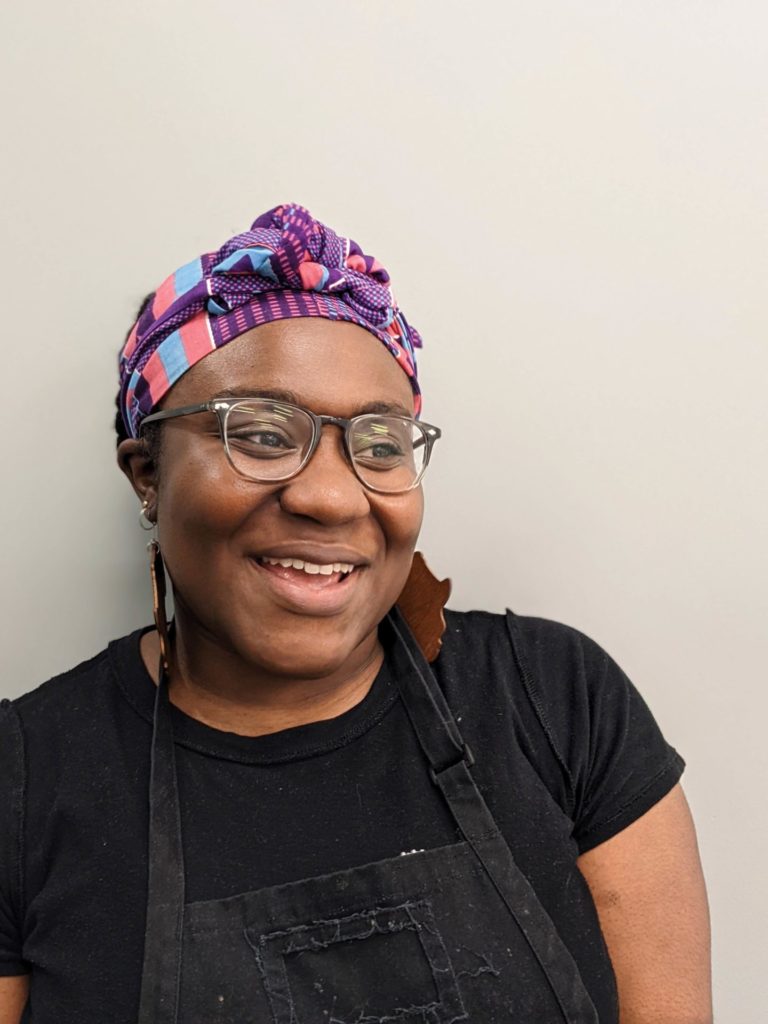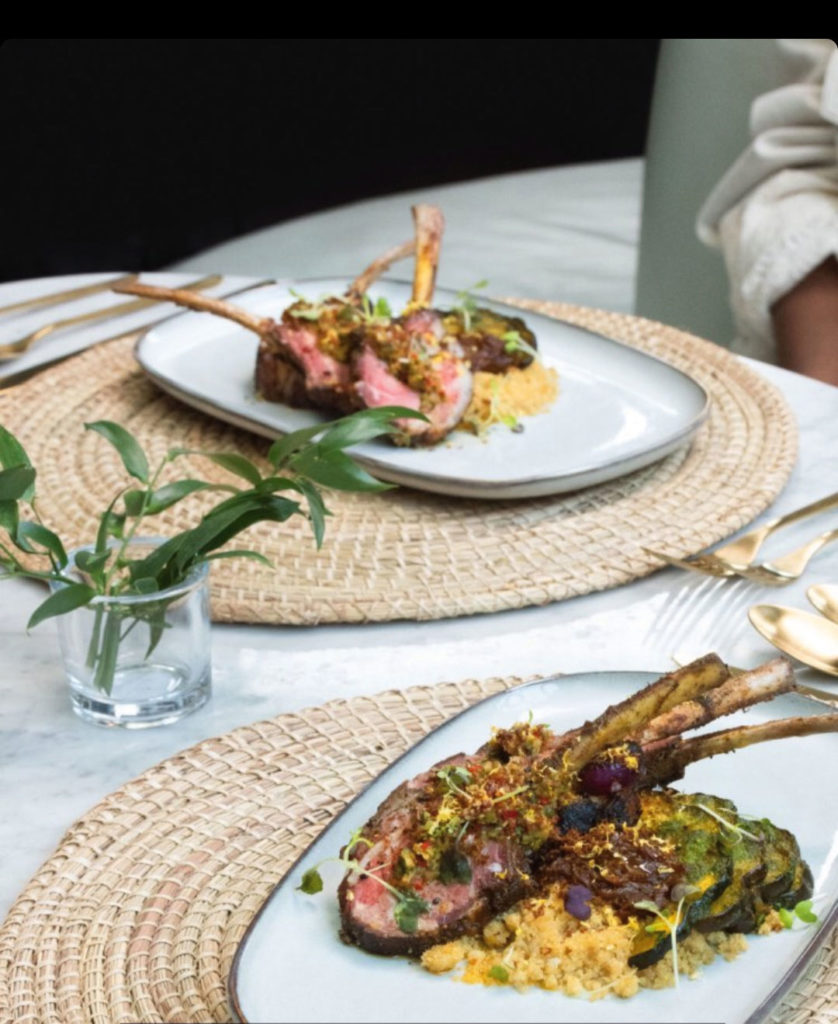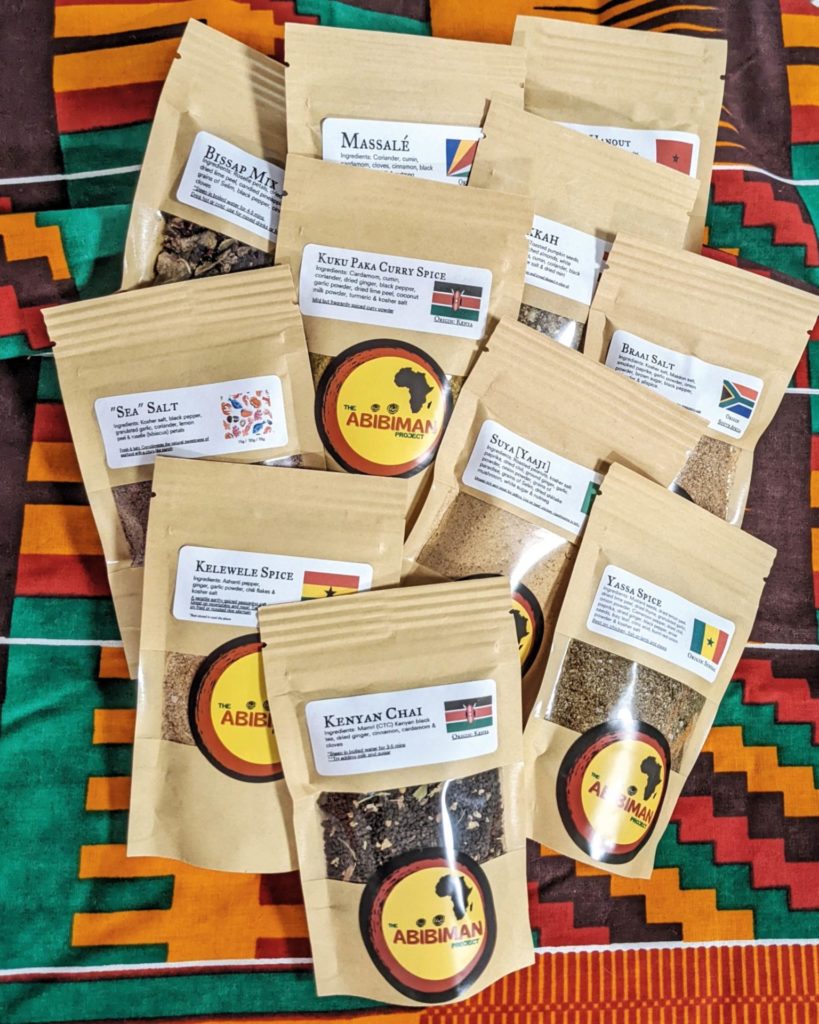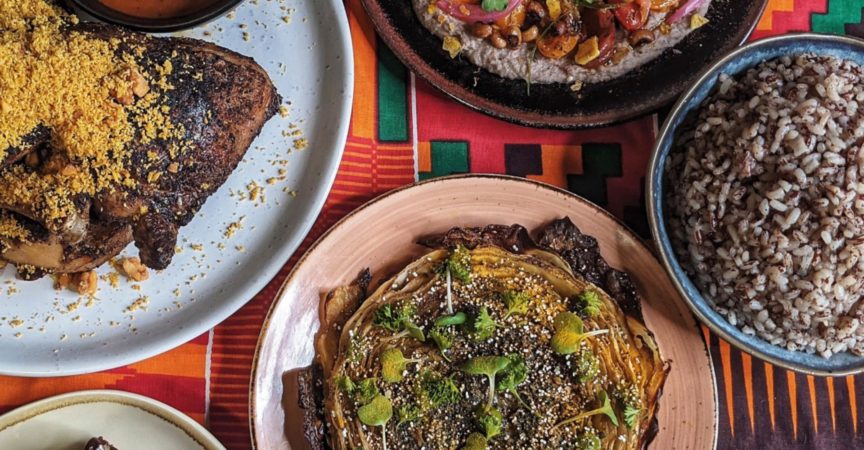Serving Up African Flavours to Give Back

Rachel Adjei is the force behind The Abibiman Project, a Toronto food concept that celebrates diverse cultures and cuisines from the African continent and Black diaspora. Her weekly pop-up dinner series and line of specialty food products elevate authentic regional African flavours and dishes through food education and experiences while giving back to her community.
Born and raised in Toronto’s Rexdale neighbourhood, food was always central to Rachel’s tight-knit family life. She entered culinary studies at George Brown, but soon left for Quebec and then moved on to France to work. “Those were very formative experiences”, she acknowledges. “I was independent and self-driven, and those experiences were explicit in showing me how representation was lacking in the food industry. I experienced a lot of discrimination, and it was very challenging being a young Black woman working in that field, especially in small towns. When I returned to Toronto, my confidence in my culinary skills had dwindled significantly.”
Born and raised in Toronto’s Rexdale neighbourhood, food was always central to Rachel’s tight-knit family life. She entered culinary studies at George Brown, but soon left for Quebec and then moved on to France to work. “Those were very formative experiences”, she acknowledges. “I was independent and self-driven, and those experiences were explicit in showing me how representation was lacking in the food industry. I experienced a lot of discrimination, and it was very challenging being a young Black woman working in that field, especially in small towns. When I returned to Toronto, my confidence in my culinary skills had dwindled significantly.”
Rachel stayed in the industry, finishing school while seeking out entry-level kitchen roles, opting to work her way up. She trained in East and Southeast Asian cuisine until workplace barriers and the intensity of the job convinced her to return to school to study pastry. “I fell in love with the delicate aspects and beauty of the pastry industry but during the pandemic, I lost my job. I found work in a butcher shop and helped out friends in their pastry shop. They offered me space to get my first pop-ups off the ground and, in the summer of 2020 when people were protesting and speaking up for Black people’s rights to be heard and seen, I wanted to use my skill set to make change. There’s a group called Afri-Can FoodBasket that provides Black folks with culturally appropriate food. They focus on food justice farming, and at that time, they were making culturally appropriate emergency food baskets for people in the Black community. I started my pop-up to support that and, during the first year of what would become The Abibiman Project, I donated all profits to that organization.”
Rachel started small, selling Ghanaian peanut soup and Kenyan-style curry as well as crafting desserts featuring African ingredients. “That was my way of expressing my identity through my food,” she says. “It allowed me to combine my training with my traditional foods and introduce people to what African cooking has to offer while using that food experience to tell the stories of the people it belongs to.” Through her food, Rachel found a way to have important, if sometimes uncomfortable, conversations about why African food isn’t seen or celebrated within the culinary industry and why Black voices are silenced in the food industry, even though they helped build it. “African food is generally considered “less than”—ethnic food is considered “less than”, and those populations often end up being the only champions of that cuisine,” she shares. “We have less access to our ingredients at an affordable cost, so we have to make substitutions and that takes away from the presence the food could have. The ingredients are not accessible and therefore not palatable for the general public, who have little or no exposure to those flavours. When you place French food and food from Mali side by side, most people will have no experience with the food from Mali, so they make the unfortunate assumption that the less familiar food is “no good” or unhealthy or too spicy—these preconceived notions make it very challenging for Black food to be seen. It is reduced to catch-alls like jerk chicken and jollof rice.”
As her pop-ups continued to build an audience around the city, demand for Rachel’s spice blends, coffees, pastries and chocolate bars grew. “All of my products are developed from the traditional African ingredients or recipes, with my own twist. They make African food more accessible while hopefully increasing awareness and popularity so that more Black chefs like me can create African foods and still be successful.”
The Abibiman Project’s pop-ups take place weekly and are designed to reconnect or introduce people to traditional African flavours. The dinners serve a broad customer base comprised of immigrants of African descent as well as curious foodies from all backgrounds. “My pop-ups are intimate experiences serving 15-20 people each week,” Rachel says. “Last November, we started a new series with an evolving menu that provides guests with a broader background for each African region. We’re currently doing the Swahili Coast, rotating dishes from Kenya, Tanzania, Mozambique and the Comoros Islands so that people can try seafood dishes, for example, from the different areas within that larger region and understand the similarities and the differences.”


These differences and details are important to Rachel and central to The Abibiman Project’s offering. “I would like for the hospitality industry to be more supportive of African food, but with respect for where it comes from and made in the most authentic way possible,” she says. “I want the industry to expect and welcome African food portrayed by African chefs who have the experience and knowledge or others who have done the work to thoroughly educate themselves so the representation of the food isn’t skewed to the Western palate. It’s not as challenging as it seems—there are so many Black people working in kitchens who could be those credible sources.”
Many guests are “regulars” who return as the menu evolves. As word of mouth grows, reservations can be tough to come by, but Rachel is focused on growing her business and her social impact. “I want to reach as many audiences as possible while supporting local Black farmers, Black food sovereignty initiatives and continuing to work with and support Afri-Can FoodBasket. Eventually, I want to offer cooking classes for low-income youth and connect with local communities to educate people on the value of our foods. There’s a demographic purchasing our product who have the luxury of purchasing our product, but there’s also a demographic who are unable to access our product, yet still deserve to be connected to food in that way. Connecting with cultural foods provides a sense of dignity. I want to be in a position where I can support smart, talented Black folks who haven’t been given opportunities and have experienced discrimination in other settings.” Rachel’s business relies on the speed and security of the Interac e-transfer platform to collect customer payments. She was approached to partner with the company as part of their commitment to small business and community investment. “Interac really doesn’t have anything to gain, it’s a choice they’re actively making to support entrepreneurs and small business,” she says. “That’s rare for large corporations. They’ve invited us to participate in further opportunities—it’s not a one-and-done.”

This content was sponsored by Interac in support of women in the foodservice and hospitality industry.
Rachel leverages the Interac e-Transfer platform as a fast and secure way to receive payment from her customers. She also uses the Interac e-Transfer service to give back to her community. Extra proceeds from her sales aredonated to Afri-Can FoodBasket, an organization in Toronto that grants access to culturally appropriate foods for the African Canadian community.









